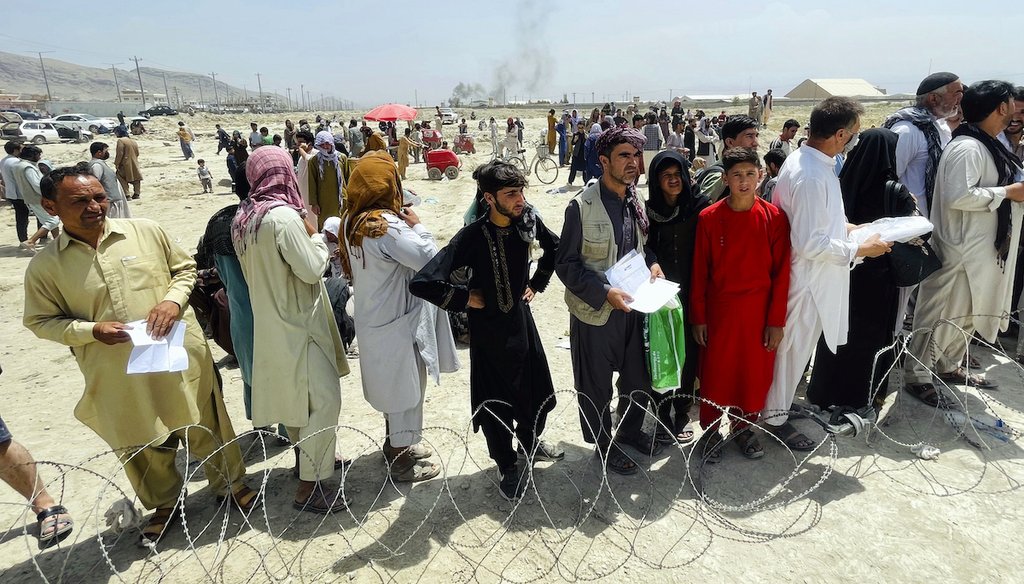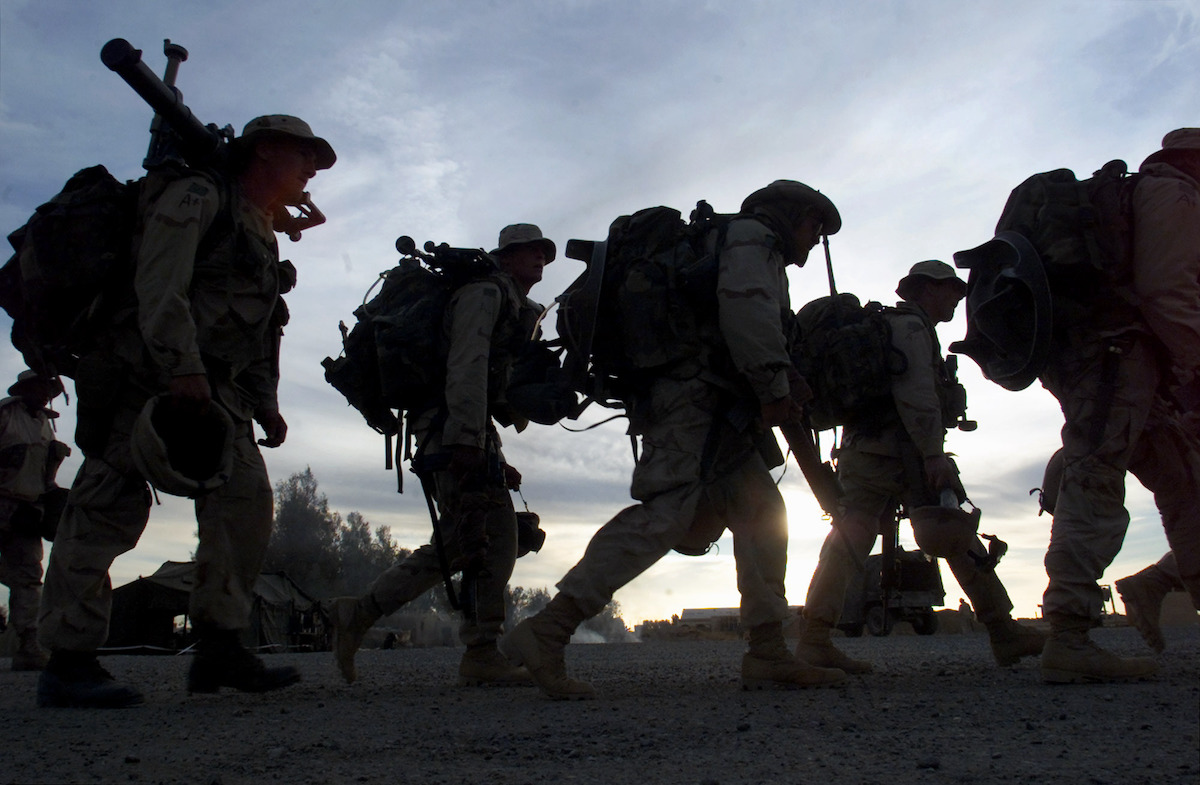Get PolitiFact in your inbox.

Hundreds of people gather outside the international airport in Kabul, Afghanistan, Aug. 17, 2021. (AP)
If Your Time is short
-
The United States has spent about $2.26 trillion between 2001 and 2021 on the war in Afghanistan according to an analysis by Brown University’s Costs of War project.
-
It’s estimated that 241,000 people died as a result of the war in Afghanistan. Most were Afghans. The largest number of deaths were for the national military and police, followed by opposition fighters and then civilians.
-
The U.S. military had six civilians and 2,442 soldiers die as a direct result of the war, as well as nearly 4,000 U.S. contractors.
President Joe Biden's Aug. 16 speech on Afghanistan — after the Taliban took over — highlighted a tough foreign policy issue that some people haven't paid attention to recently. Here, we'll answer common questions that Biden's speech raises and note where his claims lack evidence or context.
The United States’ recent involvement in Afghanistan started after al Qaeda, a terrorist group based in Afghanistan, attacked the United States on Sept. 11, 2001.
Biden said: "Our mission in Afghanistan was never supposed to have been nation building. It was never supposed to be creating a unified, centralized democracy."
We fact-checked a similar statement by Biden in 2010 and rated it Half True. The U.S. wasn’t officially nation building, but elements of what the U.S. was doing could be described that way.
Marvin G. Weinbaum, an analyst for Pakistan and Afghanistan in the U.S. State Department from 1999 to 2003, told us this week that "nation building" was always a misnomer.
"What we were engaged in was state building," said Weinbaum, now director for Afghanistan and Pakistan Studies at The Middle East Institute. "They had a nation. A nation involves people's identity. What they didn’t have were institutions of a state, so that’s what we were engaged in."
The U.S. helped establish a framework for a new government and constitution, which is state building.
In a speech to the Council on Foreign Relations in October 2001, Biden tried to thread the needle by saying the U.S. goal was to "roll up all al Qaeda cells around the world" and then provide the "foundation for future reconstruction of that country."
Biden said: "I am reluctant to use the word nation building because it is such a loaded political term these days. But if we leave Afghanistan in chaos it will be another time bomb waiting to explode, and there is an enormous powder keg right next door in Pakistan."
Michael O’Hanlon, a foreign policy expert at the Brookings Institution, told us that nation building "was attempted in Afghanistan, for better or worse, for a counterterrorism purpose."
Biden "should acknowledge the shift in logic rather than pretend we never attempted state building," O’Hanlon said.
"In fairness to him, he had become skeptical about the state building sooner than most, which is why he opposed Obama’s big surge in troops 12 years ago," Hanlon said. "But even then, he never advocated pulling out entirely, and he did not do so after we killed (Osama) bin Laden, either."
Somewhere between $2 trillion and $3 trillion.
There are different ways to calculate the amount of money the U.S. has spent on the war, such as whether you count future costs for veterans’ health care. But one commonly cited source is an April 2021 analysis by the Costs of War project at Brown University.
The project found that the United States since 2001 has spent about $2.26 trillion on the Afghanistan war. The total includes interest on war borrowing and $296 billion for veterans’ care. The total figure does not include lifetime care for veterans or future interest payments on money borrowed to pay for the war.
Biden said, "So I’m left again to ask of those who argue that we should stay: How many more generations of America’s daughters and sons would you have me send to fight Afghans — Afghanistan’s civil war when Afghan troops will not? How many more lives — American lives — is it worth? How many endless rows of headstones at Arlington National Cemetery?"
The Costs of War project’s analysis estimated that 241,000 people died directly as a result of the war. Most were Afghans. The largest number of deaths were for the national military and police, followed by opposition fighters and then civilians.
From October 2001 to April 2021, the U.S. military had six civilians and 2,442 soldiers die as a direct result of the war, as well as nearly 4,000 U.S. contractors, according to the Costs of War project at Brown University. These figures do not include deaths caused by disease, loss of access to food, water, infrastructure, or other indirect consequences of the war.
Biden said part of why the U.S. did not begin evacuating Afghan civilians sooner was that "some of the Afghans did not want to leave earlier — still hopeful for their country. And part of it was because the Afghan government and its supporters discouraged us from organizing a mass exodus to avoid triggering, as they said, ‘a crisis of confidence’."
It’s possible that some didn’t want to leave, but Biden omits that there was a backlog of Afghan interpreters who had already applied to leave.
A State Department spokesperson said in July that there were approximately 18,000 Afghan applicants to the Special Immigrant Visa process as of May.
In addition to the 18,000 Afghans who provided service to the U.S. military, including as translators, the Migration Policy Institute said that 53,000 family members also remained in the processing backlog earlier this year. The processing of the visas takes more than two years to complete, the institute said.
According to the State Department, a law enacted on July 30, 2021, authorized 8,000 additional special immigrant visas for Afghans, for a total of 34,500 visas allocated since Dec. 19, 2014.
Biden on Aug. 16 said that a U.S. operation had moved 2,000 Afghans out of Afghanistan under the visa program and that in the coming days, the U.S. military will provide assistance to bring more eligible Afghans to the U.S.
Under Trump, the United States and the Taliban agreed in February 2020 to a May 2021 U.S. withdrawal deadline, with the Taliban pledging to stop attacks on foreign forces and to enter negotiations with the Afghan government.
Biden announced on April 14 that the U.S. military "will not conduct a hasty rush to the exit" but would leave before the 20th anniversary of the 9/11 attacks.
In a speech July 8, Biden said that the Taliban was at "its strongest militarily since 2001." But Biden called for moving ahead on the withdrawal based on the agreement made under the Trump administration.
RELATED: Vietnam and Afghanistan: Different wars, similar endings?
RELATED: Trump didn’t say he ‘trusted’ Taliban, but did plan earlier Afghanistan exit than Biden
Our Sources
White House, Remarks by President Biden on Afghanistan, Aug. 16, 2021
Brown University’s Costs of War project, April 2021
USA Today, "A timeline of the US withdrawal and Taliban recapture of Afghanistan," Aug. 15, 2021
AP, Counting the costs of America’s 20-year war in Afghanistan, April 30, 2021
BBC, Biden's speech on Afghanistan fact-checked, Aug. 17, 2021
William and Mary, U.S. troop withdrawal from Afghanistan: A Q&A with Rani Mullen, Aug. 9, 2021
Carnegie Endowment for International Peace, Special Immigrant Visas for Foreign Interpreters, June 23, 2021
NPR, Evacuation Of Afghan Interpreters And Others Who Aided U.S. To Begin In Late July, July 14, 2021
Congressional Research Service, U.S. War Costs, Casualties, and Personnel Levels Since 9/11, April 18, 2019
Federal News Service transcript, Senate Foreign Relations Committee hearing (accessed in Nexis), Feb. 26, 2003
C-Span, Sen. Biden at Senate Foreign Relations Committee hearing, Feb. 26, 2003
Factcheck.org, Timeline of U.S. Withdrawal from Afghanistan, Aug. 17, 2021
Congress.gov, H.R.3985 - Averting Loss of Life and Injury by Expediting SIVs Act of 2021,
U.S. Department of State, Special Immigrant Visas for Afghans - Who Were Employed by/on Behalf of the U.S. Government, Accessed Aug. 18, 2021
Associated Press, Costs of the Afghanistan war, in lives and dollars, Aug. 17, 2021
State Department, Agreement for Bringing Peace to Afghanistan, Feb. 29, 2020
PolitiFact, U.S. continues its military drawdown in Afghanistan, July 12, 2021
PolitiFact, Joe Biden says U.S. 'is not engaged in nation-building' in Afghanistan, July 20, 2010
Email interview, Stephanie Savell, senior researcher, Watson Institute for International and Public Affairs, Brown University, Aug. 17, 2021
Email interview, Christopher Sherwood, spokesperson for the Office of the Secretary of Defense, Aug. 17, 2021
Email interview, Michael O’Hanlon, senior fellow, and director of research, in Foreign Policy at Brookings Institution, Aug. 17, 2021
Telephone interview, Marvin Weinbaum, director, Afghanistan and Pakistan studies at the Middle East Institute, Aug. 17, 2021
Email interview, Mackenzie Eaglen,senior fellow at the American Enterprise Institute, Aug. 18, 2021
Email interview, Steve Ellis, president of Taxpayers for Common Sense, Aug. 18, 2021











































